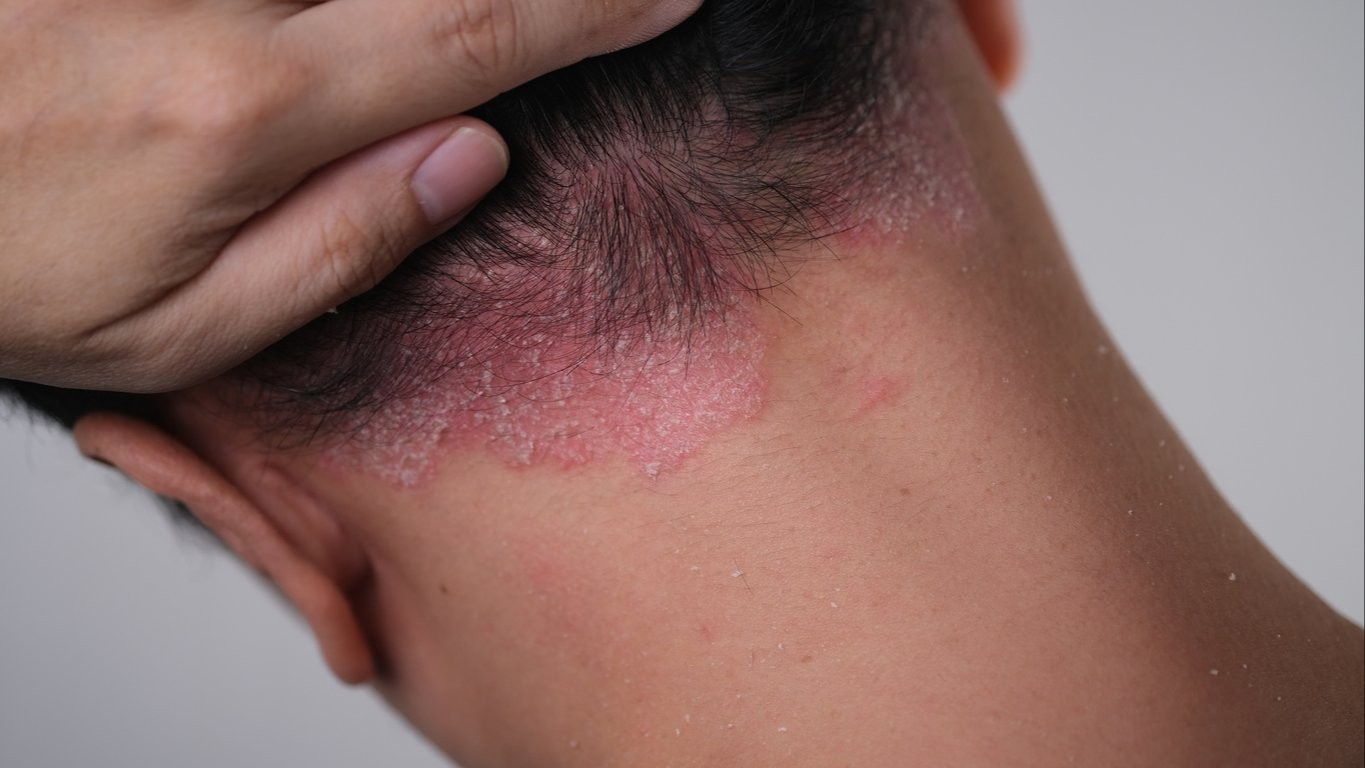If you've ever experienced intense itching, flaking, or patches on your scalp, you might be dealing with scalp psoriasis, a common yet complex skin disorder. This condition affects millions worldwide and often goes misdiagnosed due to its similarity to dandruff and other scalp conditions. Understanding the signs, symptoms, and treatments of scalp psoriasis can help manage and ease the discomfort, leading to better skin health and overall well-being.

What Scalp Psoriasis Looks Like
Scalp psoriasis presents in a range of symptoms that can differ from person to person, with severity varying from mild to intense. A primary indicator of scalp psoriasis is red patches on the scalp, covered with thick, silvery scales. These patches are typically raised and can be quite visible. Patients often notice flaking, which might resemble dandruff but is generally more severe, causing embarrassment and discomfort because it can fall onto clothing throughout the day.
Psoriasis on the scalp can spread beyond the hairline, appearing as dry, red patches on the forehead, back of the neck, or behind the ears. In more severe cases, there might be temporary hair loss, caused by excessive scratching or the stress resulting from the condition. Identifying these signs early can be crucial in differentiating it from other scalp issues like dandruff or eczema. For further details on how to identify scalp psoriasis, this WebMD guide is helpful.
What Causes Scalp Psoriasis
The exact cause of scalp psoriasis remains unknown; however, it is often linked to an overactive immune system. In psoriasis, skin cells are produced at an accelerated rate, leading to the buildup of cells that form patches or plaques on the skin. Genetic factors also play a significant role, with many patients having a family history of the condition.
Environmental factors might trigger or worsen the scalp psoriasis episodes. Such triggers include stress, skin injuries, infections, and certain medications. Cold weather can also exacerbate the condition due to the drying effects on the skin. Understanding these triggers is vital for managing and potentially reducing the frequency and severity of flare-ups. For a comprehensive look at what may cause scalp psoriasis, visit the Mayo Clinic website.
Scalp Psoriasis Common Causes
Several common causes for scalp psoriasis have been identified, although it may vary from individual to individual:
- Genetics: A family history of psoriasis significantly increases the risk of developing the condition.
- Immune System: An overactive immune response can trigger rapid skin cell production, resulting in plaque formation.
- Environmental Triggers: These include stress, weather changes, and exposure to allergens.
- Infections: Infections such as strep throat can trigger or worsen scalp psoriasis.
- Lifestyle Factors: Smoking and alcohol consumption can contribute to flare-ups.
Identifying and avoiding common triggers is a proactive approach to managing scalp psoriasis. More information can be found through the NHS.
Scalp Psoriasis First Signal
The first signal of scalp psoriasis is often a minor itch or flakiness that seems persistent and does not respond to usual dandruff treatments. Over time, this progresses into red, inflamed patches that are noticeable in the scalp's hairline or upon parting the hair. Alongside itchiness, these areas can feel sore or tender to touch, which can exacerbate the desire to scratch, leading to further irritation or damage.
Since the initial signs are easy to overlook, especially if they begin mildly, it becomes important to pay close attention to changes in the scalp's condition. Early identification paves the way for effective treatment, minimizing discomfort and improving the quality of life. For more insight into early signs of scalp psoriasis, one can explore resources available at the Cleveland Clinic's website.
Treatment Options for Scalp Psoriasis
Managing scalp psoriasis involves a combination of treatments tailored to the severity of the condition and individual patient needs. Here are some effective treatments:
- Topical Treatments: These include medicated shampoos, creams, and oils containing coal tar or salicylic acid to help reduce scaling and itching.
- Phototherapy: Controlled exposure to ultraviolet light can slow down excessive skin cell production, providing relief from symptoms.
- Systemic Medications: In more severe cases, oral or injected medications are prescribed to control the immune system's role in inflammation.
- Biologics: These are designed to specifically target certain parts of the immune system rather than suppressing the entire system, showing promising results.
It is imperative to consult with dermatologists to personalize the treatment plan, considering the potential side effects and individual health conditions. An insightful overview of treatments can be explored at the National Psoriasis Foundation.
Coping with Scalp Psoriasis
Living with scalp psoriasis can be challenging, but certain strategies can greatly improve daily life:
- Regular Hair Care: Utilize gentle shampoos and conditioners to soothe the scalp, keeping it moisturized.
- Avoid Triggers: Identify and steer away from personal triggers like stress or specific hair products.
- Moisturize: Regularly moisturize the scalp to keep it hydrated and lessen the severity of scales.
- Healthy Lifestyle: Maintain a healthy diet and exercise routine, reducing inflammation and stress.
Understanding the condition and taking proactive steps can lead to a more manageable experience with scalp psoriasis. Engaging in support groups and communities can offer emotional and practical support, preventing feelings of isolation.
While scalp psoriasis is a chronic condition often posing daily challenges, understanding its manifestations and associated treatments can significantly alleviate its impact. Early detection followed by appropriate treatment and lifestyle adjustments is key in maintaining a comfortable and confident life despite the condition's challenges.


